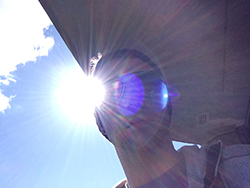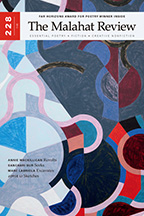Mirroring the Self: PJ Grace
in Conversation with Kate Cayley

Social Media, Marketing & Circulation Manager PJ Grace talks with Kate Cayley on folklore, obsession, and death in her short story, "The Fetch." Cayley's piece appears in Issue #185, Winter 2013 of the Malahat.
Photo credit: Carmen Farrell.
The narrator is a retired man who spends his days pottering about the house and spying on his neighbour, Harold, who he believes to be a harbinger of death. How much of the narrator’s paranoia, and his belief in his ex-wife’s folkloric tales, stems from a yearning to find fulfillment, or even excitement, in his otherwise mundane life?
I see him as a man who has lived without self-consciousness. Successful and much-married, he’s been propelled forward by an academic career, serial infidelity, children, the exhilaration of his intellectual life, all things that have distracted him from self-knowledge. His retirement, and the strain of maintaining a marriage to a woman who is decades younger than he is, has completely shattered his composure. He’s come up empty, at the end of his life, and it terrifies him. His obsession with the supernatural, the uncanny, is a response to that. That said, I like this character—he’s an asshole, and a deluded one, but I also find him funny and rueful and brave. As well as nuts.
In a way, it makes sense to me that a man with an academic, literary background, would become involved in that kind of superstition—if you spend your life tracing patterns, correspondences, areas of significance, is it a very big step to begin to see unlikely patterns and correspondences in your own life? Paranoia sometimes feels like a crass version of inference. I have a lot of superstition, and I do think it’s connected to trying to see points of contact everywhere. It’s not much of a step to find yourself in the world of portents and omens.
In recalling the story of Percy Shelley’s death, the narrator imagines how Shelley must’ve felt “underneath his fear, a completion” at seeing his fetch as a blue-lipped, drowning man on the beach. Does the narrator consider Harold, his neighbour, to be a completion of himself, a complement to his own life’s failures and regrets?
Yes, though somewhat wistfully. I think another historically minded tendency is to see the lives of people you admire as more heroic, lived larger, than your own. Of course sometimes that’s true, but never wholly—everyone experiences the banality and trouble of the body, and of time. It’s art that creates a retrospective narrative of a life. So for the narrator, Shelley is a vision of a heroic life—in which even death is part of a grand scheme, turning life to poetry. I think the narrator yearns for that, and hopes to find it in his obsession with his neighbour, but like much of his life, there’s a clumsiness in the execution.
The narrator’s intent on fetching his own fetch turns into a comical, yet terrifying, series of trespasses into Harold’s home. He has an obsession with collecting Harold’s belongings, even when he’s on the brink of getting caught. Can you shed light on the kind of power he believes these objects will grant him over Harold? How does the narrator muster this kind of fearlessness and bravery?
I’m mixing superstitions here: the “Fetch” superstition is a double who appears as a portent of death, the idea that an object belonging to an enemy grants you power over them is more general, and, like the Fetch, the narrator knows about this through his first wife, who’s a folklorist. To be honest, neither the narrator nor I are thinking very clearly here—the two don’t directly relate. The narrator craves action, and so formulates this nonsensical plan so that he won’t feel he is sitting around waiting for death to find him. This same impulse allows him to be brave and fearless—or very foolish. But even in his foolishness, there’s a life-force, an assertion of self.
What does the black dog represent at the end of the story? How does the narrator immediately understand its significance?
A black dog is a creature that means your death is imminent, though it’s not usually a small friendly dog, more of a hell-hound that you meet on a dark path or on a bridge. The “Black Dog” is from the U.K., but there are Irish and Spanish versions also. Again, being married to a folklorist would make him familiar with this. I wanted, in the story, to make the supernatural literal and ordinary. There’s a wonderful ghost story by Penelope Lively, called “Black Dog,” in which a middle-aged woman becomes convinced that she is being followed by a black dog. Her husband and adult daughters ascribe this, patronizingly, to depression, and suggest therapy and book clubs. Of course in the end the dog is there, and the conclusion is more terrifying for being integrated with commonplace details. I don’t want to give it away, but I was nervous in my own house for days after reading it.
When This World Comes to an End, your recent book of poems, deals with psyches that face death head-on, or who recognize death as a twin, a mirrored reflection, much like the narrator in “The Fetch.” What led you to focus on this subject matter in your writing, to focus on the revelations of characters faced with death? As for the narrator in “The Fetch,” is he afraid of death, or trying to embrace it?
In the poems, I’m often looking at figures in some kind of extremis (Simone Weil’s willing hunger, T. E. Lawrence’s motorcycle crash, the first man to die in the electric chair), which of course means standing face to face with death. I suppose it’s a unifying theme for me. I’m not ascetic or heroic at all in my own life, which is pretty ordinary and happy—marriage, children, work. But I think I’m drawn to these figures because they have a talent for disaster, for throwing themselves away. They seek an aesthetic or moral unity in their own lives, not just self-preservation. Easier to write about than to practice.
As for my narrator, he is absolutely terrified—the opposite of most of the figures in the poems, who will themselves to face ending, of one kind or another. But I hope the story is also a road he walks towards facing his death, I hope that’s there in the end.
What’s your next big project—fiction, poetry, or both?
I have a short story collection, my first, coming out in September with Pedlar Press (“The Fetch” is in it.) I’ve started work on a new collection of poetry, untitled as yet, which in some ways continues with the themes of When This World Comes to an End, but sideways and with a different emphasis. And I’m working on two new plays: The Bakelite Masterpiece, about art forgery and war crimes, which will be produced by Tarragon Theatre in the fall, and very early work on a play for Zuppa Theatre in Halifax, inspired by the myth of the Erl-King.

PJ Grace
* * * * * * * *









